Bestway turned 50 this year – and that called for celebration.
Last month, the wholesaler marked the milestone with a glittering celebration at the Royal Albert Hall. Hosted by Dermot O’Leary, 800 guests attended and included performances from Katherine Jenkins and Pakistani singer Rahat Fateh Ali Khan.
At the heart of the celebration was paying tribute to Bestway founder Anwar Pervez and “the 50 years of impact he has inspired”.
As part of that reflection, Bestway Wholesale MD Dawood Pervez speaks to The Grocer about the highs and lows of the past 50 years, as well as impact of the Costcutter acquisition and future plans.
What does Bestway hitting its 50th anniversary mean to you?
Everyone within the business has immense pride in this landmark achievement, especially those of us who have been part of the journey from the onset. Not just in the phenomenal growth of the business but the social impact and commitment to support health and education charities and programmes in the UK and Pakistan, through our Bestway Foundation.
It’s amazing to think that the business is now half a century old and it’s really important to remember that Bestway was founded by my father Anwar Pervez and is built on the founding principle of ‘For independent retailers, by independent retailers’. Central to my father’s thinking was providing far greater value to independent retailers with cheaper prices and greater availability – and we are still driven by the mission and values he instilled five decades ago.
Today, the company maintains its edge as the UK’s seventh-largest family business and 13th-largest privately owned enterprise. Bestway Wholesale stands proud as a £3bn business that is profitable, continuing its journey of growth and leading the market across innovation, investment and value.
What is Bestway’s biggest achievement over this time?
Our biggest achievement over the last 50 years has been in maintaining and growing that ethos and culture within the business.
In doing so, Bestway has acted as a catalyst for social mobility because we enabled a generation of immigrants (particularly those who had been expelled from Uganda and Kenya) to come to the UK and stand on their own two feet, whilst providing a valued service to society.
I believe it is a major achievement to have done that whilst continuing to drive forward in an era when there was a ‘space race’ going on with the evolution of supermarkets. In short, we became the cornerstone of the independent retailer, enabling a whole generation of retailers to set up and contribute to British society whilst earning a good living.
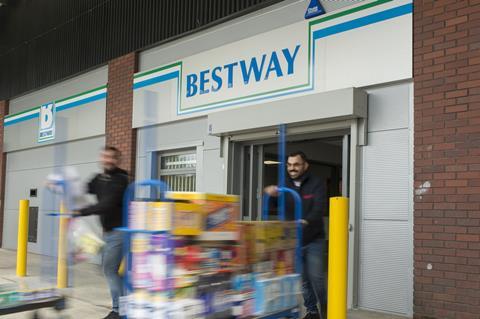
What else has changed in the past 50 years?
Let’s start with the great big supermarket boom. From shopping in the local high streets across independent stores – whether butchers, vegetable stores, fish, bakeries and so on – the consumer spend started its transition into the major supermarkets, which led to a ‘space race’.
And more recently, the supermarkets have entered the smaller footprint market, which has inevitably impacted the convenience retail market.
Despite this, independent retailers continued to carry on trading and adapted by introducing higher store standards, alongside chilled and fresh ranges and food to go to pull consumers in.
The value of local convenience includes a healthy walk with no emissions, buying what you need, reducing food waste, meeting someone familiar, which is good for your soul and mind, supporting local businesses whilst also supporting the fabric of the local community.
What are your personal highlights since being MD?
Since I took up the reins as MD in 2018, we have seen some of the most turbulent years in both wholesale and retail. This includes navigating Brexit and the associated impacts into the supply chain, followed by Covid and the availability issues it led to, and not forgetting the subsequent galloping inflation and economic and political upheaval. It has also been a period of extensive legislative change and challenge.
Among this, we have recruited and developed an exceptionally talented senior management team which now leads in the market. I am immensely proud of their achievements and the value this team brings to our business.
A further highlight has been our acquisitive programme in the past seven years, including Conviviality in 2018, Palmer & Harvey in 2018, Costcutter in 2021 and more recently, Adams Foodservice in 2024, which has led to Bestway becoming the second-largest group in fascia.
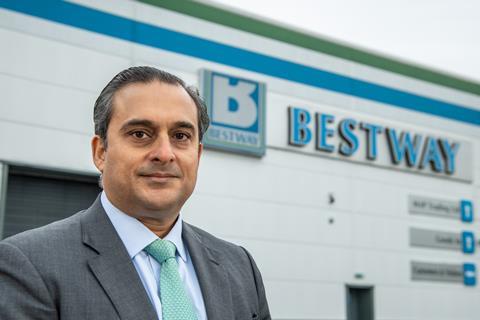
What have been the highs for Bestway over the past year?
The past year has been a rollercoaster of highs and lows. A key high for us was the acquisition of Adams Foodservice last year. This opened up new trading opportunities in the catering market, alongside the opportunity for new lines, and brought added experience and knowledge to our business. The acquisition has added a further nine depots to our existing network, enabling us to scale and grow the business – with added reach and broader customer base.
Further highs include winning a record 28 awards last year, which I am incredibly proud of across Bestway Wholesale and Bestway Retail, including the Grocer Gold Award for E-commerce Initiative of the Year, as well as entering into new long-term partnerships with our collaborative partners such as Simply Fresh and Penny Petroleum.
The success of our hybrid stores and the ongoing rollout is also one to mark, and refreshing our Best-one business, which has delivered a sales increase of 20%.
What have been the lows?
The market has changed in the last two years, with Covid and cost of living crisis forcing the consumer to deeply examine how they spend their hard-earned cash. As a result, last year saw a small decline in market share of the convenience market, driven by a price war with the mults.
There’s also the issue of legislation. The ongoing path of regulation continues to be rushed along without proper thought and evaluation. DRS is going to be a challenge, especially if positively trying to push forward into convenience alongside supermarket car parks. HFSS regulations also continue to be modified, whilst ignoring multipacks and not classifying them as ‘promotional’.
The recent changes seen on EPR and property relief will also have a negative and lasting impact on business unless modified or removed.
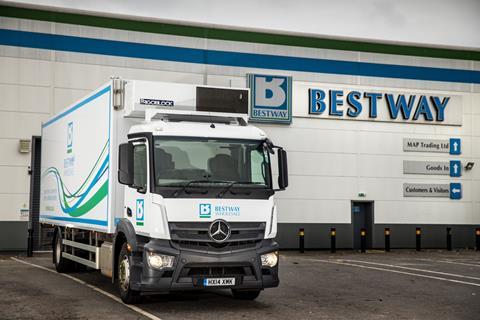
How is Bestway leveraging technology to support retailers?
We recently invested in Socio Local, a platform that empowers retailers with a smarter approach to social media. Our Bestway Vans’ strategy has also focused on developing a new technology by categorising products into ‘availability gaps’ and ‘next best line’.
This allows the team to offer visual aids and tailored discounts to retailers, ensuring the continuous distribution of ‘bestselling products’ and closing distribution gaps on the same day.
We are also investing in our website and in unifying our digital platforms more efficiently, to give retailers access to an expanded product range, greater fulfilment flexibility and desktop functionality.
How has the acquisition of Costcutter impacted your business?
The acquisition of Costcutter has been transformative for Bestway Wholesale on several levels. Strategically, it has significantly strengthened our position within the UK convenience retail market and allowed us to accelerate our growth plans by combining Costcutter’s strong retail brand with our well-established wholesale capabilities.
This synergy has led to improvements in our supply chain efficiency, customer service levels, and product range, particularly in chilled and fresh categories. Ultimately, the acquisition has allowed us to expand our reach, and enabled us to have an offer for large community-based stores with a higher element of take-home trade – all while reinforcing our long-term commitment to championing the independent retail sector in the UK.
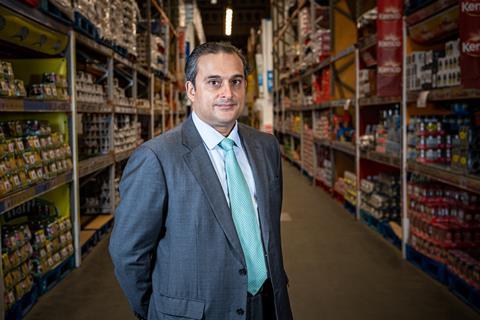
How is the Best-in own label range faring?
In 2024, we launched our new and prized ‘Best-in’ own label range, previously known as ‘Best-one’. The new range has been specially designed for its quality and value, due to the fact that inflation is driving consumers to opt out of categories across branded lines. The 343-strong SKU range continues to see growth, with core grocery returning a 18% sales uplift as well as 4% rise in volume, and offers retailers margins up to 75%.
A key driver behind our Best-in range is to ensure the range is available and accessible to all our customer base, regardless of the fascia and so every member of the Bestway Wholesale business has access to the full Best-in range. We are devoting further investment to reviewing additional products and announcements will be made in due course.
What is Bestway doing to offer more value to retailers?
All the above supports this question. We believe that as a business we do more than any wholesaler to offer more value to retailers, driving new thinking and transformational strategies.
Market-leading models such as our hybrid stores, investments in keeping prices down, supporting margin points for retailers, and continuous promotions, show we’re staying agile and conceiving fresh innovation that leads the sector.
Everything we do is based on offering more value to our customers.







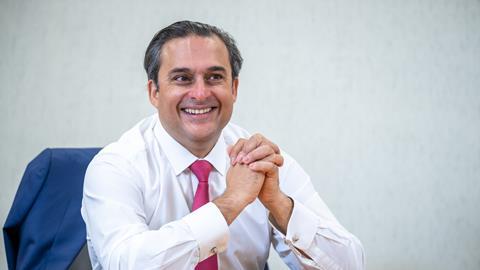
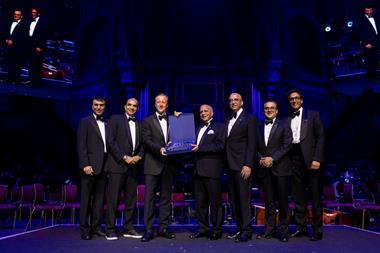
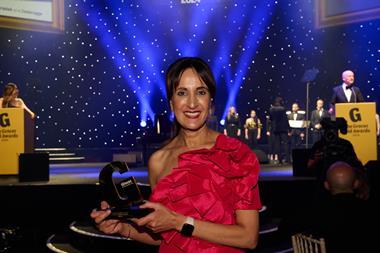










No comments yet